Cortisol Reset: Supplements + Daily Habits That Work
Introduction
Cortisol isn’t the enemy — it’s your built-in energy rhythm.
It wakes you up, helps you focus, and keeps your blood sugar stable throughout the day. But when stress becomes constant — from work pressure, poor sleep, or emotional overload — cortisol stops following its natural flow.
Instead of rising in the morning and dipping at night, it stays elevated (or crashes altogether). This leads to a wide range of symptoms: fatigue, anxiety, weight gain, insomnia, irritability, and even brain fog.
The good news? You can reset your cortisol rhythm naturally. 🌞
This article explores how cortisol works, what throws it off balance, and how to bring it back in sync through supplements, nutrition, and daily habits that actually work.
Looking for supplements for This? Click here.
🌞 Understanding Cortisol: The Rhythm of Stress and Energy
Cortisol is produced by your adrenal glands under the command of the HPA axis — the communication loop between your brain (hypothalamus + pituitary) and your adrenals.
Under normal conditions:
Cortisol peaks in the morning, giving you energy and motivation.
It gradually declines during the day, helping you wind down.
It’s lowest at night, allowing melatonin and deep sleep to take over.
When this rhythm gets disrupted, your whole body feels it — from your mood to your metabolism.
Common Cortisol Imbalances:
High all day: constant anxiety, restlessness, tension, and cravings.
High at night: can’t sleep, racing thoughts, “tired but wired.”
Low all day: burnout, fatigue, and low motivation.
Flat rhythm: long-term adrenal dysfunction, low resilience, emotional numbness.
A cortisol reset means retraining your brain and body to remember this rhythm again. 🌿
🌿 What Disrupts Cortisol Balance
Modern life is a perfect storm for adrenal overload. These are the main culprits:
Chronic stress: emotional pressure, deadlines, or toxic environments.
Sleep deprivation: even one night of poor sleep raises cortisol by up to 37%.
Caffeine overuse: spikes cortisol and exhausts the adrenal system.
Inflammatory diet: processed foods, excess sugar, alcohol.
Sedentary lifestyle: too little movement reduces cortisol clearance.
Overtraining: too much intense exercise keeps cortisol elevated.
Unresolved emotions: chronic worry or repressed feelings trigger constant alert signals.
When your system is always “on,” your adrenals lose their ability to regulate cortisol effectively — leading to exhaustion and dysregulation. 🌙
🌸 Step 1: Reset Through Foundational Daily Habits
Before supplements, your lifestyle rhythm must align with cortisol’s natural flow.
🌞 Morning Light Exposure
Within 30 minutes of waking, get sunlight on your skin and eyes (without sunglasses if possible).
This simple act anchors your cortisol peak and melatonin timing for the day.
Even 10 minutes of outdoor light can reset your circadian rhythm.
🌿 Delay Caffeine for 60–90 Minutes
Cortisol is naturally highest when you wake up. Drinking coffee immediately can cause an unnecessary cortisol surge, leading to later crashes.
Wait at least an hour after waking before your first cup.
Pair coffee with breakfast to stabilize blood sugar.
🍳 Eat a Protein-Rich Breakfast
Skipping breakfast or eating only carbs can cause mid-morning cortisol and glucose spikes.
Include 20–30g of protein (eggs, Greek yogurt, or plant protein shake) with healthy fats and fiber.
This helps keep cortisol stable throughout the day. 🌿
🧘 Incorporate Breathwork or Mindfulness
Deep breathing signals safety to your nervous system.
Try box breathing — inhale 4 seconds, hold 4, exhale 4, hold 4 — for 2–3 minutes.
Regular breathwork can lower cortisol by as much as 20–25% over time.
🏃 Exercise — But in Balance
Moderate activity lowers cortisol, but extreme endurance or high-intensity training raises it.
Choose gentle, restorative forms like:
Strength training (3–4x/week)
Walking in sunlight
Yoga or mobility work
Short, intense workouts with recovery days
Exercise should energize, not deplete you. 🌸
🌙 Protect Sleep Like Medicine
Sleep is the ultimate cortisol regulator.
Lack of sleep increases next-day cortisol and decreases melatonin.
Aim for 7–9 hours nightly.
Avoid screens 1 hour before bed.
Keep your room cool (18–20°C).
Try a magnesium or glycine supplement before sleep for calm.
When sleep is consistent, cortisol automatically realigns. 🌿
💧 Hydrate and Replenish Electrolytes
Dehydration triggers cortisol release.
Drink water steadily throughout the day and add mineral-rich electrolytes (sodium, magnesium, potassium) if sweating or fasting.
📵 Schedule Restorative “Off Time”
Cortisol thrives on rhythm — not endless stimulation.
Have dedicated no-screen, no-task periods daily to let your nervous system breathe.
Walking in nature, journaling, or simply sitting in silence helps signal “I’m safe now.” 🌸
🌞 Step 2: Supplements That Support Cortisol Reset
Once your foundation is set, supplements can accelerate recovery.
Think of them as gentle allies that restore balance to the HPA axis and rebuild resilience.
🌿 Magnesium (Glycinate or Malate)
Magnesium regulates the stress response and promotes relaxation.
Low magnesium increases cortisol and adrenaline sensitivity.
Benefits:
Calms the nervous system
Supports sleep quality
Enhances GABA activity
Dosage: 200–400 mg before bed.
Best forms: Magnesium glycinate (for calm), magnesium malate (for energy). 🌸
🌿 Vitamin C
The adrenal glands store the highest concentration of vitamin C in the body. During stress, they deplete it quickly.
Benefits:
Protects adrenals from oxidative stress
Lowers elevated cortisol
Supports immune balance
Dosage: 500–1000 mg daily with meals. 🌞
🌿 B Vitamins (Especially B5, B6, and B12)
B vitamins are essential for adrenal hormone production and nervous system balance.
Benefits:
Boosts energy and focus
Reduces fatigue
Supports mood neurotransmitters
Dosage: Use a methylated B-complex once daily with food.
Looking for supplements for This? Click here.
🌿 Omega-3 Fatty Acids
Omega-3s lower inflammation and modulate cortisol through effects on cell membranes and brain signaling.
Benefits:
Calms anxiety
Improves focus and mood
Reduces cortisol and inflammation
Dosage: 1000–2000 mg combined EPA/DHA daily.
Choose a high-quality fish oil or algae-based alternative. 🌸
🌿 Adaptogens
Adaptogens retrain your HPA axis to respond better to stress.
They don’t just lower cortisol — they restore flexibility.
Best adaptogens for cortisol balance:
Ashwagandha: reduces high cortisol and supports sleep.
Rhodiola Rosea: enhances focus and energy without overstimulation.
Holy Basil (Tulsi): improves mood and stress tolerance.
Schisandra: supports adrenal detox and hormonal recovery.
Take for 8–12 weeks for best results. 🌿
🌿 Phosphatidylserine (PS)
A phospholipid that helps normalize cortisol feedback signaling in the brain.
Benefits:
Lowers nighttime cortisol
Improves memory and focus
Enhances post-exercise recovery
Dosage: 200–400 mg daily (evening recommended). 🌙
🌿 L-Theanine
Found in green tea, L-theanine promotes alpha brain waves — calm focus without sedation.
Benefits:
Reduces stress-induced cortisol spikes
Balances caffeine effects
Improves mental clarity
Dosage: 100–200 mg as needed, or pair with morning caffeine. 🌞
🌿 Probiotics and Gut Support
Your gut bacteria influence cortisol production through the gut-brain axis.
When your microbiome is imbalanced, stress hormones become erratic.
Best strains:
Lactobacillus rhamnosus
Bifidobacterium longum
Add: fermented foods (yogurt, kefir, kimchi, miso) + a daily probiotic. 🌿
🌿 Coenzyme Q10 (CoQ10)
Supports mitochondrial energy production, which is often depleted in chronic stress.
Benefits:
Increases physical and mental endurance
Reduces fatigue
Protects adrenal and heart function
Dosage: 100–200 mg per day with healthy fats. 🌞
🌿 Glycine
A calming amino acid that reduces nighttime cortisol and enhances deep sleep.
Benefits:
Promotes muscle repair
Supports relaxation and thermoregulation at night
Dosage: 3–5 g before bed, mixed in water or tea. 🌙
🌿 Step 3: Nutrition for Cortisol Reset
Food is information for your hormones.
What you eat can either amplify stress or restore balance.
🌞 Eat to Support Stable Energy
Prioritize whole proteins (fish, eggs, tofu, beans).
Add healthy fats (avocado, olive oil, nuts).
Choose slow carbs (sweet potato, quinoa, oats).
Eat regularly — skipping meals triggers cortisol release.
🌿 Include Anti-Inflammatory Foods
Inflammation keeps cortisol high. Add:
Fatty fish
Berries
Leafy greens
Turmeric and ginger
Green tea or matcha
🌸 Balance Blood Sugar
Each glucose crash triggers cortisol release.
Avoid:
Excess caffeine
Refined sugars
Skipping meals
Balance every meal with protein + fat + fiber. 🌿
🌞 Step 4: Restore Rhythm with Mind–Body Alignment
Your cortisol rhythm is a feedback loop between body and brain.
Training your nervous system to feel safe is key to a long-term reset.
🌙 Breathwork for Adrenal Calm
Practice slow breathing before meals or at bedtime to signal rest mode.
Exhale longer than you inhale to stimulate your vagus nerve.
🌞 Mindful Morning Routines
Avoid checking your phone immediately upon waking.
Instead, stretch, hydrate, and journal before digital stimulation.
This gives your nervous system time to regulate cortisol naturally. 🌸
🌿 Cold Exposure and Contrast Therapy
Cold showers or alternating hot–cold exposure can retrain your HPA axis to become more adaptable to stress.
Start with 30 seconds of cool water and gradually increase.
🌙 Evening Rituals to Lower Cortisol
Cortisol must drop for melatonin to rise.
Dim lights after sunset.
Avoid screens and work tasks.
Read, meditate, or take magnesium.
Even small rituals — candlelight or herbal tea — signal “rest mode.” 🌿
🌿 Step 5: Rebuilding Emotional Resilience
No supplement can replace emotional safety.
Cortisol only resets fully when your body stops feeling like it’s in danger.
🌞 Practice Gratitude
Gratitude journaling lowers cortisol by increasing serotonin and oxytocin.
🌿 Reconnect with People
Healthy relationships reduce perceived stress. Physical affection, laughter, and community lower cortisol dramatically.
🌸 Prioritize Joy
Joyful activities — music, art, nature — retrain your nervous system to associate life with calm, not chaos.
When your brain learns that the world is safe again, cortisol naturally returns to balance. 🌿✨
🌙 Realistic Timeline for Cortisol Reset
Week 1–2: Improved energy stability and reduced anxiety.
Week 3–4: Better sleep, clearer focus, fewer cravings.
Week 6–8: Restored morning alertness and calm evenings.
3 months+: Stable mood, normalized weight, lasting resilience.
Cortisol healing is gradual — think rhythm, not quick fix. 🌞
🌿 The Takeaway
Cortisol isn’t a problem to eliminate — it’s a rhythm to restore.
When you sync your body with light, rest, and nourishment, your adrenal system remembers how to function effortlessly.
With magnesium to calm the nerves, vitamin C to protect the adrenals, adaptogens to restore rhythm, and daily rituals that teach safety — you can finally reset your cortisol and rediscover steady, calm energy again.
Because true stress management isn’t about doing less.
It’s about doing what’s sustainable — and living in tune with your body’s design. 🌿✨
Looking for online therapy ? Click Here.
📚 References
McEwen BS. “Protective and Damaging Effects of Stress Mediators.” New England Journal of Medicine, 1998.
Chrousos GP. “Stress and Disorders of the Stress System.” Nature Reviews Endocrinology, 2009.
Lovallo WR et al. “Caffeine, Stress, and Cortisol Rhythms.” Psychosomatic Medicine, 2005.
Panossian A & Wikman G. “Adaptogens in Stress Management.” Phytomedicine, 2010.
Maggini S et al. “Vitamin C and the Stress Response.” Nutrients, 2017.
Otten J et al. “B Vitamins and Energy Metabolism.” Journal of Human Nutrition, 2018.
Peuhkuri K et al. “Magnesium and Sleep Regulation.” Nutrients, 2012.
Cryan JF et al. “Gut Microbiota and Stress Regulation.” Physiological Reviews, 2019.
Seifried HE et al. “Antioxidants and Cortisol Modulation.” Free Radical Biology & Medicine, 2007.
Lopresti AL et al. “Herbal and Nutritional Strategies for Adrenal Balance.” Phytotherapy Research, 2020.
Related Posts
-
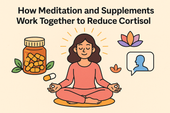
How Meditation and Supplements Work Together to Reduce Cortisol: A Complete Guide to Calming the Mind and Body
Meditation and supplements can work hand in hand to naturally reduce cortisol, your body’s main stress hormone. 🌿 Learn how mindfulness practices, adaptogenic herbs, and nutrient support like magnesium, omega-3s, and B vitamins create a powerful synergy for calm, focus, and emotional balance—backed by science and daily rituals that truly reset your stress response.
-
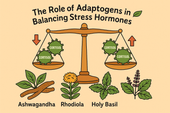
The Role of Adaptogens in Balancing Stress Hormones
Adaptogens work at the root of stress — your nervous system. 🌿 Learn how these powerful herbs help regulate cortisol, calm your nerves, and restore balance between energy and relaxation. ✨
-
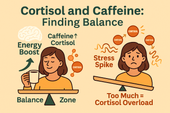
Cortisol and Caffeine: How Much Is Too Much?
Caffeine can boost energy and focus — but too much can overstimulate your stress hormones. ☕ Learn how caffeine affects cortisol, energy levels, and mood, and discover how to find the perfect balance for lasting calm and clarity. 🌿
-
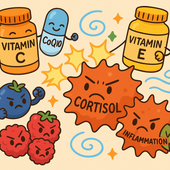
Antioxidants for Stress Management and Cortisol Control
When stress overwhelms your body, antioxidants come to the rescue. 🌿 Learn how vitamin C, CoQ10, and other natural compounds help reduce oxidative stress, regulate cortisol, and restore calm energy from within. ✨
-
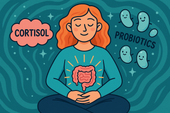
Cortisol and Gut Health: How Probiotics May Help
Chronic stress doesn’t just affect your mind — it changes your gut. 🌿 Learn how cortisol disrupts the microbiome and how probiotics can help restore balance, improve digestion, and calm your stress response naturally. ✨
-

Vitamin D and Cortisol: Supporting Immune Balance
Vitamin D does more than strengthen bones — it helps regulate cortisol and support immune balance. 🌞 Learn how this essential hormone-like nutrient restores calm, improves mood, and strengthens your body’s natural stress defenses. 🌿
-
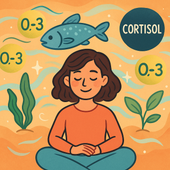
Omega-3s and Cortisol: Fighting Inflammation Naturally
Omega-3s are more than heart-healthy fats — they’re natural cortisol regulators. 🌿 Learn how EPA and DHA help reduce chronic inflammation, calm the nervous system, and support stress recovery from the inside out. ✨
-
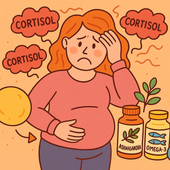
High Cortisol and Belly Fat: Can Supplements Help?
Chronic stress can make belly fat harder to lose — but supplements like ashwagandha, magnesium, and omega-3s may help restore cortisol balance. 🌿 Learn how science-backed nutrients support fat metabolism, calm your stress response, and bring your body back into harmony. ✨
-
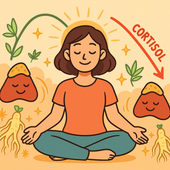
How Ginseng Can Support Energy and Cortisol Balance
Ginseng is one of nature’s most powerful adaptogens, helping your body handle stress without burning out. 🌿 Learn how this ancient root supports balanced cortisol, steady energy, and sharper focus — restoring vitality naturally and sustainably. ✨
-
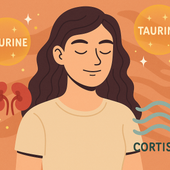
Taurine and Cortisol: Supporting Focus Under Stress
When cortisol surges, focus fades — but taurine helps restore balance. 🌿 Learn how this powerful amino acid calms your nervous system, regulates stress hormones, and sharpens concentration without jitters or fatigue. ✨
-
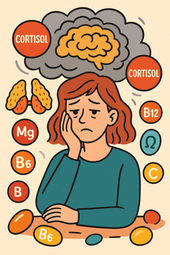
The Link Between Cortisol, Brain Fog, and Nutrient Deficiencies
When brain fog sets in, it’s not just in your head — it’s in your hormones. 🌿 Discover how cortisol imbalance and nutrient deficiencies like low magnesium, B vitamins, and omega-3s can cloud your focus and how restoring balance brings back mental clarity and calm. ✨
-
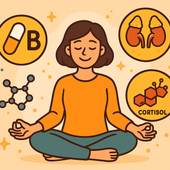
B Vitamins for Stress, Energy, and Cortisol Regulation
B vitamins are the foundation of stress resilience and steady energy. 🌿 Learn how this essential group of nutrients helps regulate cortisol, restore focus, and keep your nervous system calm — giving you balance from the inside out. ✨
-

Cortisol Imbalance and Chronic Fatigue: Can Supplements Help?
When chronic stress keeps cortisol high, fatigue and brain fog follow. 🌿 Learn how to rebalance your stress hormones naturally with calming nutrients, adaptogens, and lifestyle rituals that restore energy, focus, and inner peace. ✨
-

Adaptogen Stacks for Better Sleep and Lower Stress Hormones
Adaptogens can help your body recover from stress and sleep better by regulating key hormones like cortisol and adrenaline. 🌿 Learn how adaptogen stacks work to restore balance, calm the mind, and rebuild resilience — so you can rest deeply and wake renewed. ✨
-

Phosphatidylserine for Nighttime Cortisol Control
When stress hormones stay high at night, deep rest becomes impossible. 🌙 Discover how phosphatidylserine helps calm the brain, reduce nighttime cortisol, and restore healthy sleep rhythms — so you can wake up peaceful, clear, and recharged. ✨
-

Magnesium for Stress Relief and Cortisol Reduction
Magnesium is one of the most powerful natural tools for stress relief. 🌿 This essential mineral calms your nervous system, lowers cortisol, and helps your body recover from chronic tension. Learn how magnesium replenishes balance, improves sleep, and restores inner peace — naturally. ✨
-

Supplements to Improve Sleep by Balancing Cortisol
When cortisol stays high at night, sleep becomes a struggle. 🌙 Discover natural supplements that calm the nervous system, lower stress hormones, and restore your body’s natural rhythm. From magnesium and ashwagandha to L-theanine and phosphatidylserine, learn how to build deeper, more restorative rest. 🌿
-

Cortisol and Sleep: Why Stress Keeps You Awake
When stress keeps your body in fight-or-flight mode, cortisol refuses to calm down — and sleep becomes impossible. 🌙 Learn how elevated cortisol disrupts your circadian rhythm, suppresses melatonin, and turns restless nights into exhaustion. Discover how to restore balance and reclaim deep rest. ✨
-

L-Theanine for Cortisol Balance and Anxiety Relief
L-Theanine — the calming amino acid from green tea — helps quiet the mind and balance cortisol, the body’s key stress hormone. 🌿 Learn how it promotes calm focus, eases anxiety, and supports deep rest without sedation, backed by modern research and centuries of tradition. ✨
-

Rhodiola Rosea and Stress Resilience: A Natural Cortisol Regulator
Rhodiola rosea is one of nature’s most powerful tools for resilience. 🌿 This Arctic root helps balance cortisol, fight fatigue, and sharpen focus — keeping you calm yet energized even under stress. Discover the science behind Rhodiola’s adaptogenic power and how it helps your body thrive under pressure. ✨
-

Ashwagandha for Cortisol Balance: What the Science Says
Ashwagandha helps your body recover from chronic stress by calming the adrenal system and balancing cortisol — your key stress hormone. 🌿 Learn what science says about this powerful adaptogen, how it restores energy and focus, and why it’s one of nature’s most effective tools for modern stress relief. ✨
-

Supplements That Naturally Lower Cortisol Levels
When cortisol levels calm, your energy transforms — no more crashes or jitters, just steady focus and inner peace. 🌿 Learn which natural supplements and habits lower stress hormones, boost calm energy, and help your body thrive with balance instead of burnout. ✨
-

What Is Cortisol Imbalance? Symptoms You Shouldn’t Ignore
Cortisol — your body’s main stress hormone — keeps you alert and energized, but when it’s out of balance, it can drain your health. 🌿 Learn the signs of cortisol imbalance, from fatigue and anxiety to sleep disruption and stubborn weight gain, and discover how to restore calm, energy, and hormonal harmony naturally. ✨
-

The Best Daily Multivitamins for Menopausal Women
Menopause brings new nutritional needs that your old vitamin routine may no longer meet. 🌿 Discover how the right daily multivitamin can boost energy, balance mood, support bone and heart health, and keep your skin glowing. Learn which nutrients truly matter — from vitamin D to magnesium and B12 — to feel strong and vibrant every day. ✨
-

Antioxidants and Menopause: Fighting Inflammation Naturally
During menopause, oxidative stress and inflammation can quietly accelerate aging, fatigue, and skin changes. 🌿 Learn how antioxidants — from vitamins C and E to polyphenols in berries and green tea — help neutralize free radicals, reduce inflammation, and restore balance naturally. Discover the science of radiant, resilient aging. ✨
-

How CoQ10 Supports Heart Health After Menopause
After menopause, heart health becomes more important than ever. ❤️ Discover how CoQ10 — your body’s natural energy molecule — supports cardiovascular strength, restores vitality, and protects against oxidative stress. Learn how this essential nutrient helps keep your heart energized, balanced, and resilient through every stage of life. 🌿
-

Collagen Supplements for Skin and Joint Health Post-Menopause
After menopause, collagen loss affects both skin elasticity and joint comfort — but supplements can help rebuild from within. 🌸 Learn how collagen peptides, vitamin C, and other nutrients work together to restore firmness, reduce stiffness, and keep you glowing and mobile well into your next chapter. ✨
-

Calcium and Vitamin D: Protecting Bone Health in Menopause
Menopause brings hormonal changes that can weaken bones—but with the right nutrients, strength and stability can be rebuilt. 🦴 Learn how calcium and vitamin D work together to protect bone density, prevent fractures, and keep your body resilient. This guide explores nutrition, sunlight, and lifestyle habits that help your bones stay strong and vibrant for years to come. ☀️💪
-

Adaptogens for Energy and Resilience During Menopause
Feeling drained or emotionally scattered during menopause? 🌿 Discover how adaptogenic herbs like Ashwagandha, Rhodiola, and Ginseng can restore energy, balance cortisol, and build emotional resilience. Learn how these natural allies work with your body—not against it—to help you stay strong, focused, and calm through life’s hormonal changes. 🌸
-

Supplements That Help Beat Menopause Fatigue
Menopause fatigue can feel like more than tiredness—it’s a total energy crash. This guide explores how specific supplements, mindful breathwork, and therapy can help restore balance. Learn how nutrients like B vitamins, magnesium, and adaptogens rebuild your stamina, while breathwork and emotional healing calm your nervous system and bring vitality back to your days. 🌿✨
-

Herbal Blends for Menopausal Restlessness: Finding Calm in Transition
Herbal blends bring the wisdom of nature into moments of rest and renewal. Discover how soothing herbs like chamomile, lemon balm, and ashwagandha work together to calm menopausal restlessness, balance hormones, and invite deep relaxation. 🌿💫
-

Magnesium + Glycine for Deep Sleep During Menopause
Nutrients like magnesium, glycine, and B vitamins form the foundation for deep, restorative sleep during menopause. Discover how these natural compounds calm your nervous system, balance hormones, and help you wake up refreshed and recharged. 🌿💤
-

Melatonin and Menopause: Restoring Your Sleep Cycle
Nutrients are the foundation of hormone balance and energy. Learn how vitamins, minerals, and whole foods like greens, salmon, and berries nourish women’s bodies during menopause and beyond — restoring vitality, mood, and strength. 🌿🥗
-

How L-Theanine Helps With Menopausal Anxiety
Science continually deepens our understanding of the human body, from hormones to neurotransmitters. Discover how evidence-based research shapes modern wellness — bridging natural medicine, neuroscience, and hormone balance for healthier living. 🔬🌿
-

Can Ginkgo Biloba Improve Memory in Menopausal Women?
Hormone therapy can be a powerful tool for easing menopause symptoms and restoring balance. Learn how it works, the types available, and how to combine it safely with lifestyle and natural support for optimal well-being. 🌸💊
-

B Vitamins for Mental Clarity During Menopause
Nutrients are the foundation of mental and physical balance during menopause. Discover how vitamins, minerals, and whole foods like leafy greens, fish, nuts, and citrus can fuel energy, clarity, and calm while supporting hormonal health. 🌿✨
-

Mood Swings and Menopause: Natural Nutrient Support
Probiotics do more than support digestion — they help balance mood, hormones, and immunity too. Learn how a healthy gut microbiome can ease menopause symptoms, boost energy, and improve emotional resilience naturally. 🌿🦠
-

Brain Fog in Menopause: Supplements That May Help
Supplements can be powerful allies in restoring balance, energy, and focus—especially during menopause. Learn how nutrients like omega-3s, vitamin D, magnesium, and herbal adaptogens work together to support brain health, reduce stress, and promote lasting vitality. 🌿💊
-

Adaptogen Stacks for Reducing Night Sweats
Hormone detox isn’t about cleansing your body—it’s about restoring flow. Learn how the liver, gut, and endocrine systems work together to eliminate hormone buildup and how herbs like milk thistle, dandelion, and schisandra support balance, clarity, and natural vitality. 🌿💫
-

Cooling Menopause Symptoms with Herbal Support
Ashwagandha is one of nature’s most powerful adaptogens, helping women manage stress, sleep better, and balance hormones naturally. Discover how this ancient root supports calm energy, emotional resilience, and relief from menopause-related anxiety and fatigue. 🌿💫
-

Evening Primrose Oil and Menopause: What the Research Says
Hot flashes are one of the most common—and frustrating—symptoms of menopause. Discover what causes them, why the body’s “internal thermostat” becomes unbalanced, and the natural supplements and lifestyle shifts that can help you cool down, rest better, and feel more in control. 🔥💧
-

How Black Cohosh Helps with Menopausal Symptoms
Sleep disturbances are among the most exhausting symptoms of menopause—but they don’t have to rule your nights. Discover how natural strategies and calming supplements can help you fall asleep faster, stay asleep longer, and wake up feeling truly restored. 🌙💤
-

Natural Supplements That May Reduce Hot Flashes
Hot flashes can disrupt sleep, confidence, and daily comfort—but natural relief is possible. Discover the best research-backed supplements like black cohosh, red clover, and licorice root that may reduce hot flashes, balance hormones, and restore inner calm during menopause. 🌿💫
-

Omega-3s and Menopause: Supporting Mood and Inflammation
Omega-3 fatty acids are essential for hormonal harmony, brain function, and emotional balance—especially during menopause. Learn how these healthy fats reduce inflammation, support heart health, and restore calm, vitality, and focus through every stage of midlife. 🌊💫
-

The Role of Vitamin D in Menopausal Health
Vitamin D plays a powerful role in menopausal health—supporting bone strength, hormone balance, and mood stability. Discover how optimizing your vitamin D levels can improve sleep, energy, and emotional well-being while protecting long-term vitality through every stage of menopause. 🌞💪
-

Magnesium for Menopause: Relaxation, Sleep, and Hormonal Support
Self-regulation is the art of staying calm, centered, and in control—no matter what life throws your way. Learn how to strengthen emotional balance, manage stress responses, and cultivate inner peace through mindful techniques that reconnect your heart, body, and brain. 🌿💫
-

Can Adaptogens Like Ashwagandha Ease Menopausal Symptoms?
Brain fog during menopause can make even simple tasks feel overwhelming—but you’re not losing your sharpness, your hormones are simply shifting. Discover how adaptogens like ashwagandha and key nutrients can restore mental clarity, balance cortisol, and bring calm focus back to your day. 🌿🧠
-

Supplements That Support Hormonal Balance During Menopause
Herbal supplements have supported women’s health for centuries—and modern science is finally catching up. From ashwagandha and maca to red clover and rhodiola, discover how nature’s most trusted herbs can calm stress, balance hormones, and enhance energy through every life stage. 🌿✨
-

The Ultimate Motivation Stack: Supplements That Work Together
Discover how therapy helps restore motivation, focus, and emotional balance alongside supplement and mindset strategies. This empowering article explores how addressing thought patterns and emotional blocks through therapy can complement biochemical tools for long-term drive and well-being. 🧠💬

















































